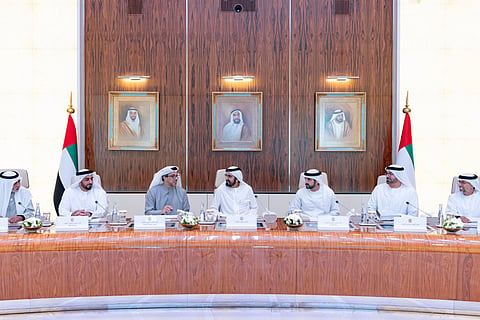UAE ranks among top 5 globally in competitiveness
UAE first in the world for the absence of bureaucracy, second for adaptability

Abu Dhabi: The UAE jumped from 28th place in 2009 to join the world’s top five nations in competitiveness, government efficiency, the strength of its legislation, and the quality of its business environment, according to the 2025 World Competitiveness Ranking released by the International Institute for Management Development (IMD).
The results were announced during a Cabinet meeting chaired by His Highness Sheikh Mohammed bin Rashid Al Maktoum, Vice President, Prime Minister, and Ruler of Dubai, held today at Qasr Al Watan in Abu Dhabi.
“These achievements are a testament to years of dedicated work and the relentless pursuit of government excellence,” Sheikh Mohammed said in a series of tweets on X following the meeting. “The UAE has risen from 28th place in 2009 to now stand among the top five globally in competitiveness, government efficiency, the strength of legislation, and the quality of its business environment.”
First in zero bureaucracy
The UAE also ranked first in the world for the absence of bureaucracy, second for adaptability, and fourth for government efficiency, marking a milestone in the country’s ongoing drive to reshape the nature of public service.
“These achievements are a testament to years of dedicated work and the relentless pursuit of government excellence,” Sheikh Mohammed said in a series of tweets on X following the meeting. “The UAE has risen from 28th place in 2009 to now stand among the top five globally in competitiveness, government efficiency, the strength of legislation, and the quality of its business environment.”
Sheikh Mohammed credited the nation’s progress to a strategic vision set more than 16 years ago, which saw the establishment of a federal competitiveness centre and the integration of efforts across all key government entities.
According to the report, the UAE’s climb to first place globally for the absence of bureaucracy was made possible thanks to sweeping reforms that have eliminated unnecessary procedures and streamlined public services. The country was also ranked second for adaptability, a measure of how rapidly it can respond to changing global and domestic circumstances.
New housing support
During the Cabinet meeting, the government approved new housing support for more than 1,838 Emirati citizens in the first half of 2025, amounting to Dh 1.2 billion. “We are committed to supporting Emiratis to get dignified housing to strengthen family stability in the UAE,” Sheikh Mohammed said.
Other major decisions included approving the results and ongoing projects of the Emirates Council for Balanced Development, which is chaired by Sheikh Theyab bin Mohamed bin Zayed Al Nahyan. The council has launched initiatives to boost tourism, create job opportunities for youth, and support small businesses across the country. “No part of the UAE, whether near or far, will be left behind from the nation’s development momentum,” Sheikh Mohammed declared.
The Cabinet also re-formed the Supreme Committee overseeing the UAE's National Strategy to Combat Money Laundering and Terrorist Financing, chaired by Sheikh Abdullah bin Zayed Al Nahyan.
The committee has achieved significant progress in strengthening the UAE’s strategies and procedures for combating money laundering and terrorist financing in recent years.
“The committee will continue to make every effort to ensure that the UAE maintains its position as a global leader in combating money laundering and counter-terrorism financing while remaining a secure, peaceful nation and an ideal business hub that attracts entrepreneurs and companies across all sectors,” Sheikh Mohammed said.
UAE Pass users rise
The Cabinet also discussed the outcomes of implementing UAE Pass in government services. The number of users registered with the UAE PASS system has now surpassed 11 million, with the platform recording over 600 million logins.
The unified digital system for federal government services connects more than 130 government entities and several private sector institutions, enabling the execution of over 2.6 billion digital transactions with efficiency, accuracy, and speed. “Our sincere thanks and appreciation to the dedicated team behind this successful national system,” the UAE Vice President added.
The Council of Ministers also approved the establishment of the National Maritime Navigation Centre under the supervision of the Ministry of Energy and Infrastructure.
The new centre will be responsible for managing and operating the integrated national maritime system for monitoring maritime traffic, as well as overseeing the unified national maritime window.
The centre will play a key role in enhancing the safety and security of the maritime sector, strengthening mechanisms to prevent harmful practices, protecting the country’s marine environment, and advancing the sector through scientific research and maritime studies.
During the same meeting, the Cabinet okayed the report of the Higher Committee for the UAE's Free Trade Negotiations for 2024, which highlighted the signing and completion of negotiations on 27 Comprehensive Economic Partnership Agreements (CEPAs) with strategic global economies.
Ten of these agreements have already entered into force. The Cabinet also reviewed ongoing efforts to finalise additional agreements with several other countries. “The Free Trade Negotiations Team has proven to be a highly effective force, contributing significantly to the UAE’s remarkable progress in foreign trade within a short period,” the Dubai Ruler said.



